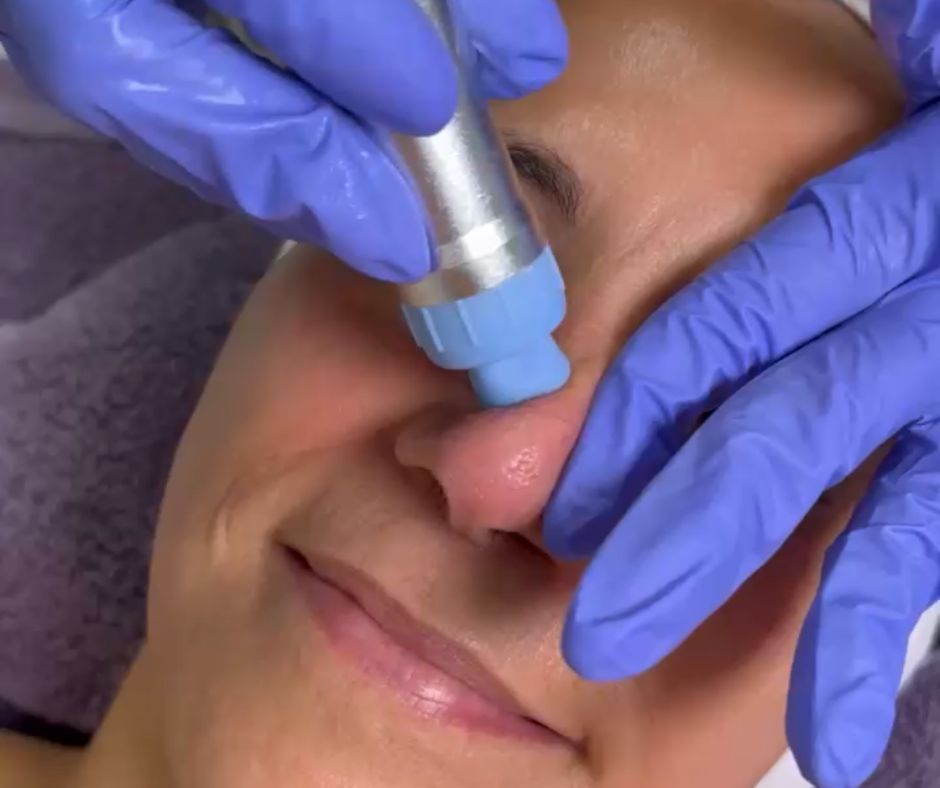Treating sensitive skin acne clients is hard, but the combination of acne with sensitive skin can be very challenging. Burning, stinging, redness, peeling, and overall irritation are common for those with acne and sensitive skin. Products with key ingredients strong enough to fight bacteria, cleanse oil, and heal the skin while calming inflammation and sensitivities are needed. When dealing with acne-prone skin sensitive skin, the main focus usually is barrier function and repair before targeting pimples and breakouts.
8 Considerations for Sensitive Skin Acne Clients
1. BARRIER FUNCTION
Research shows that most skin diseases like eczema, psoriasis, rosacea, and acne are associated with some level of impaired barrier function. When the skin barrier is impaired and not functioning properly, the skin becomes vulnerable and is prone to developing skin symptoms and conditions. Unfortunately, in this state of disruption, the skin cannot effectively heal itself.
Sensitive skin acne can get much worse because of the impaired barrier causing increased irritation and inflammation in the skin. This disrepair can create openings that make the skin more prone to bacterial overgrowth and breakouts. It is important to keep in mind that some acne treatments can potentially damage the skin barrier, which could exacerbate the issue, especially with sensitive or sensitized skin. When the barrier can finally function properly, then acne can heal.

Contribution by Shawna Rocha
Shawna Rocha is the owner of Awaken Day Spa in California and Washington. She quickly developed a love for helping clients with compromised and sensitive skin and constantly strives to gain additional knowledge and education. Since becoming an esthetician, she has completed multiple advanced courses in Oncology Esthetics, Immuno-Esthetics, and has specialized training in sensitive skin and holistic therapies. Shawna holds several certifications, including a NCEA certification, and has recently become the Director of Education for Hale and Hush Skincare. Shawna won two awards in the Skin Games 2018 (People’s Choice & Acne/Problematic Skin) and became a judge for two categories in 2019. Shawna’s current passion is writing blogs and articles regarding the skincare industry and has recently become a Dermascope Ambassador. She is truly loved by her clients and colleagues and her passion for the industry is apparent in all that she does.
2. A SIMPLE ROUTINE
The best skin routine for sensitive skin acne is simplicity. Using an excessive amount of aggressive products will not be successful with these clients. The first step with acne treatments is usually to dry the acne and reduce the oil production. But, with sensitive skin, we have to pay attention to many other factors. Topical treatments like Retin-A (tretinoin) or benzoyl peroxide can help treat acne, but they can be very damaging to sensitive skin. We want to find products that are healing and include ingredients that help barrier function.
3. CLEANSER
One of the first things to repair a damaged skin barrier is not to over-cleanse the skin. Choosing the right cleanser, that does not strip the skin of necessary oils, is essential for acne and sensitive skin. The skin needs a product that will clean the skin, not leave it dry, and work on barrier function. A cleanser for these skin types also needs to contain soothing ingredients that are anti-inflammatory, and reduce irritations and redness.

DermaJEM Specializes in Hydrodermabrasion
DermaJEM Ares and Element Feature Silicone Tips
The silicone tips available on the Ares and Element allow the professional to treat even the most sensitive skin with hydrodermabrasion. They also make extractions a breeze!
4. TONER
When the barrier is functioning properly, it is a great time for a toner. A toner with a small percentage of salicylic acid would be beneficial to control sebum and help with the prevention of future breakouts. Salicylic acid is a chemical exfoliator that is gentle enough for most skin types. It will not drain moisture from the skin or cause exfoliation and flakiness.
5. EXFOLIANT
Any type of acneic skin needs exfoliation to continue the cell cycle and promote healing. Common exfoliants and acids when the barrier is in the repair stage can be too harsh for sensitive skin. Physical exfoliants may be the answer until the barrier is repaired.
Silicone scrubbers or brushes with a good cleanser, work miraculously for this skin type. Silicone is antibacterial, easily cleaned, and gentle on irritated skin. They clean deeply and cannot damage the top layers of the skin. A physical mild polish or scrub to gently remove the dead skin buildup and debris from the skin is the next step in caring for this skin type. A mild polish with fortified ingredients twice a week will help in keeping the dead skin away.
In the treatment room, Enzymes and AHA’s are great when used on acne-prone sensitive skin. Enzymes help break down keratin to gently break up dead skin cells leading to smoother, healthier-looking skin, and fighting pigmentation and breakouts. AHAs are primarily used to exfoliate but also help prevent breakouts, lighten PIH (post-inflammatory hyperpigmentation), promote collagen, correct scarring, brighten complexion and increase product absorption.
6. SERUMS
Prescribed topical retinoids are medications usually prescribed for acne treatments and work by increasing the speed the skin sheds old, dead cells and replaces them with new ones Retinoids lower the risk of dead skin cells collecting inside pores and causing acne breakouts. Prescription retinoids can be too harsh and irritating for most sensitive skin clients. When barrier function is repaired, using a product containing retinaldehyde is imperative. The molecular size of this retinoid is smaller, usually doesn’t cause sensitivity, and is easy to absorb. Mandelic serum is also a great choice for sensitive skin. Mandelic acid helps retexture, brighten, lighten and help reduce acne scarring and redness.
7. MOISTURIZER
Moisturizer for acneic skin is a must. A non-comedogenic moisturizer with hydrating and soothing benefits is important. Those dealing with skin barrier damage should look for a moisturizer that’s rich in ingredients like ceramides, fatty acids, lipids, and hyaluronic acid. Applying a moisturizer after acne treatments can also help minimize some side effects like redness, flaking, and itching.
8. SPF
SPF for any client is a daily necessity. Sensitive skin clients must use physical sunscreens. Chemical sunscreens can cause stinging, burning, irritation, and redness. Physical sunscreens, also known as mineral sunscreens, are a gentler SPF option for sensitive skin. These products utilize mineral filters like zinc oxide and titanium dioxide and help protect the skin from UV damage.

